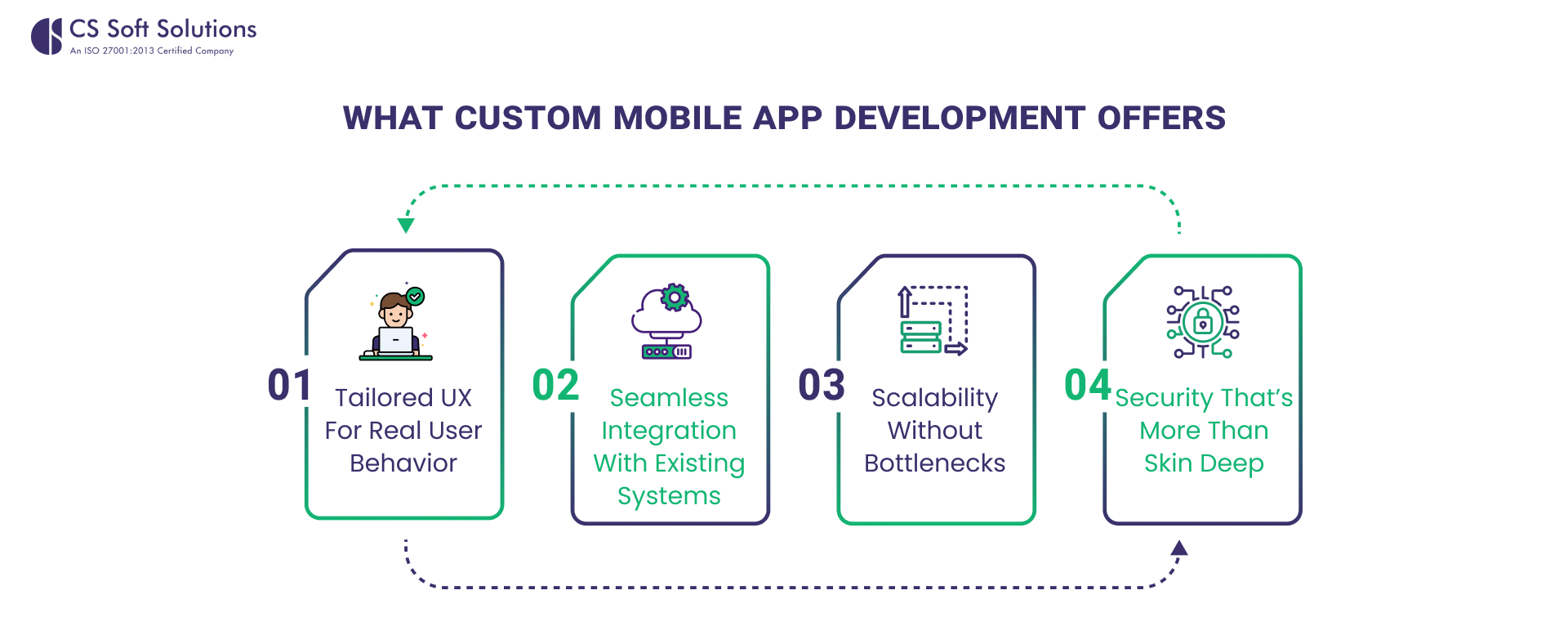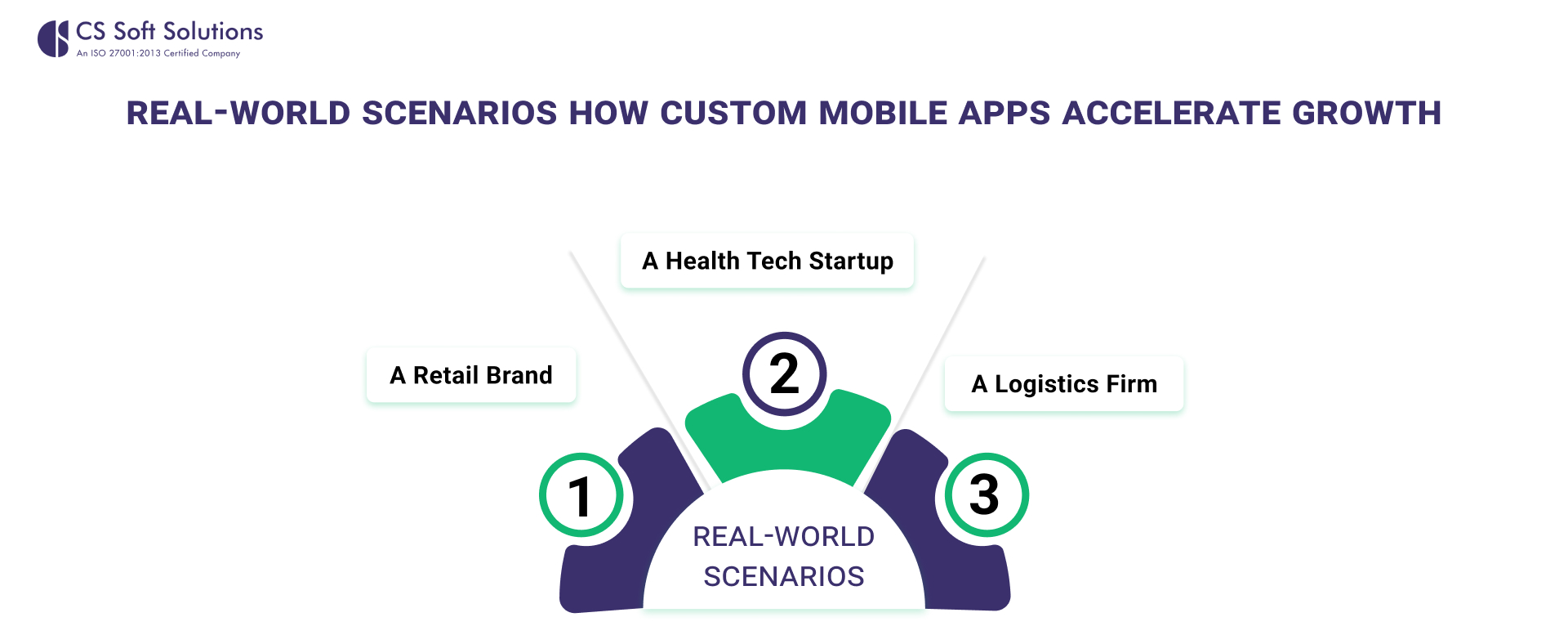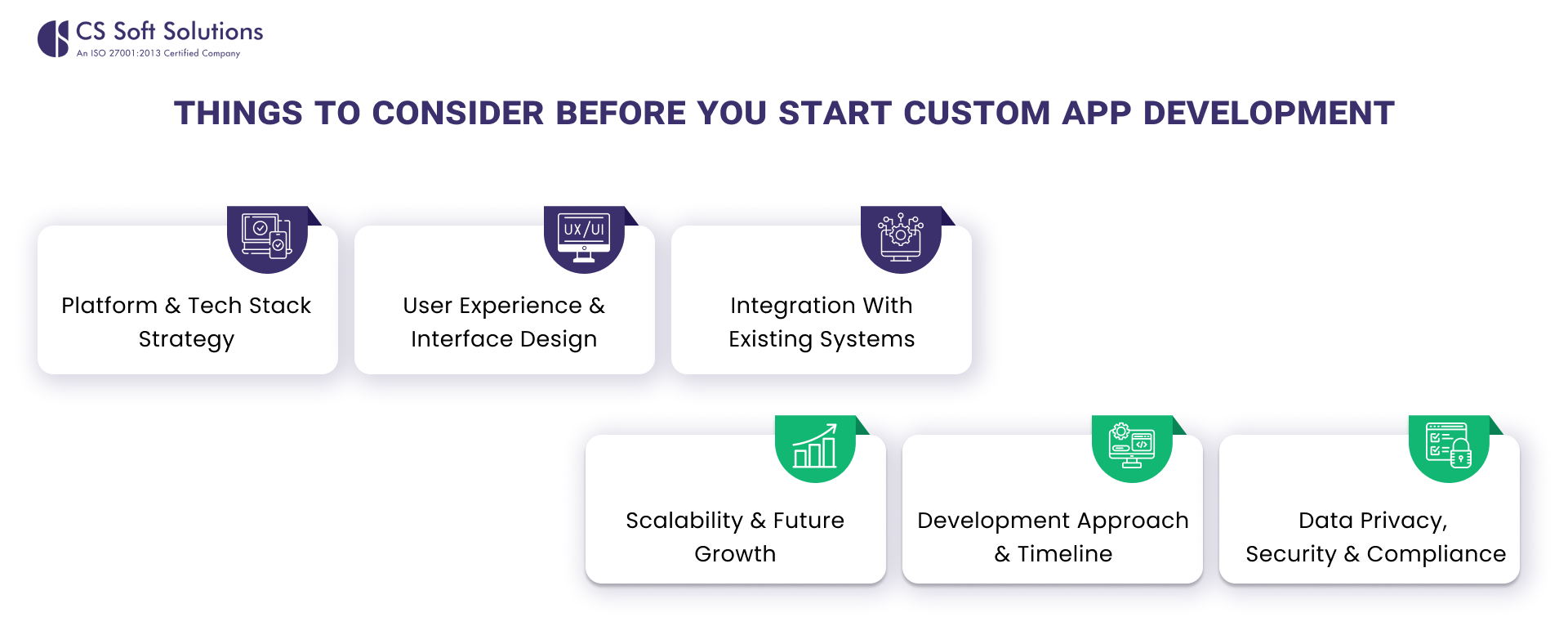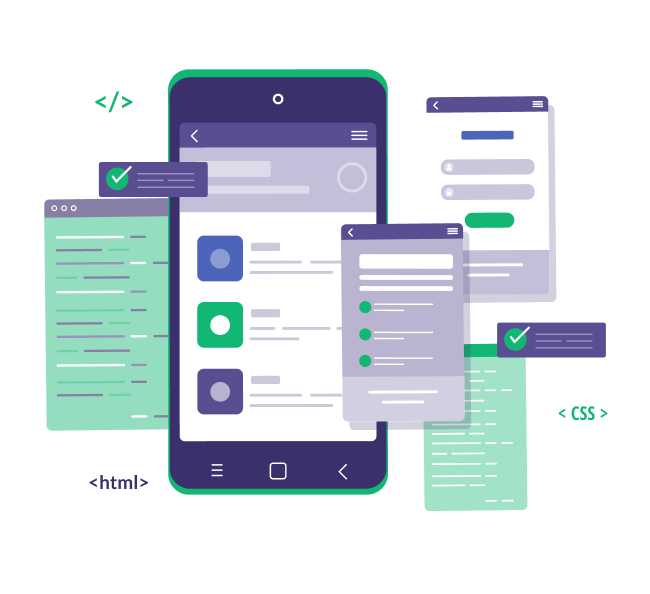
Mobile usage isn’t rising. It’s exploding. Over 90% of mobile time is spent inside apps, not browsers. And while templated solutions or cookie-cutter platforms might seem “good enough,” fast-moving brands are asking a better question: What if our app could do more than function? What if it could compete, convert, and evolve with us?
That’s where custom mobile application development enters the conversation.
Why Generic Apps Just Don’t Cut It Anymore
Plug-and-play app builders were fine, until they weren’t. For startups needing a basic MVP, or side projects testing market fit, low-cost templates offered speed. But growing brands? They need flexibility, performance, and differentiation, none of which come pre-packaged.
Here’s what outgrowing generic platforms looks like:
- You’re juggling third-party integrations that constantly break.
- Your user interface feels clunky on one device and broken on another.
- There’s no room for advanced analytics, offline capabilities, or brand identity.
- Scaling the app to meet new user demand feels like patchwork, not progress.
These are not just technical headaches, they’re brand trust killers. And they’re why brands are shifting toward custom mobile software development that supports their next five years, not just their next five months.
What Custom Mobile App Development Offers
Think beyond aesthetics. A custom mobile app isn’t about surface-level design. It’s about total alignment between your backend systems, your business logic, your user journeys, and your brand goals.
Here’s what custom development empowers:
1. Tailored UX for Real User Behavior
Not all users behave the same. Not all industries need the same flow. Custom mobile development helps build experiences around actual usage pattern data, not assumptions baked into templates.
2. Seamless Integration with Existing Systems
Already running a custom CRM, ERP, or eCommerce backend? The off-the-shelf app just won’t cooperate. Custom development makes the mobile app an integration into your ecosystem and not a stand-alone tool.
3. Scalability Without Bottlenecks
Growth shouldn’t be a technical problem. Custom app designs take advantage of performance architectures, starting from modular codebases to cloud-native infrastructures.
4. Security That’s More Than Skin Deep
Compliance requirements? Customer data? Industry regulations? Generic protections from a generic app. Custom apps offer encryption, role-based access, and an end-to-end security system that considers your risk profile.
Web and Mobile Hybrid App Development: A Wiser Choice?
Some brands still balk at all-native for cost or time reasons. Enter web and mobile hybrid app development. Hybrid apps deliver native-like performance while sharing codebases that are almost twice the speed to deploy across platforms built using frameworks like React Native or Flutter.
“Hybrid” doesn’t imply compromise. When done right, it means:
- Consistent UX across Android, iOS, and web
- Easier maintenance and updates
- Shorter time to market
- Lower overall dev costs
It’s a powerful middle ground, especially when combined with custom strategies that prioritize speed and sophistication.
Enter: Low Code & No Code – Shortcut or Smart Play?
The rise of low code no code mobile app development has opened up exciting possibilities. Departmental marketing, internal operations, and HR are able to produce their apps without having to write full stacks of code.
But here is the nuance: Low-code platforms do serve their purpose for internal tools and rapid prototyping. They’re not replacements for scalable, consumer-facing applications. Instead, growing brands are using them to:
-
- Build MVPs to validate the market need
- Test new workflows or user features internally
- Empower non-dev teams to build lightweight apps for operational efficiency
In other words, they’re not an “instead of” custom development; they’re an adjunct to it. The future isn’t code vs no code it’s knowing when to use which.
Real-World Scenarios: How Custom Mobile Apps Accelerate Growth
Let’s bring it to life. Here’s how different brands are leveraging custom mobile application development to push forward:
A Retail Brand
A fashion retailer uses a custom app that integrates with its inventory in real-time, enables virtual try-ons using AR, and personalized promotions based on user behavior. The result? 3x conversion rate compared to its mobile website.
A Health Tech Startup
Instead of building around a limited SaaS solution, a startup creates a HIPAA-compliant app tailored to patient workflows, with secure telehealth features and appointment scheduling baked in.
A Logistics Firm
Using a custom mobile software development approach, the company builds an app for drivers that tracks routes, logs fuel usage, and provides real-time customer updates. Backend dashboards provide analytics that improve delivery performance by 18%.
These aren’t just apps they’re competitive advantages built into the palm of your hand.
Things to Consider Before You Start Custom App Development
When it comes to building your custom app, you must evaluate these six crucial areas to avoid wasted time, misaligned goals, or unexpected costs:
1. Platform & Tech Stack Strategy
Deciding on if the program will be native or hybrid or web-based is equally important. In other words, if cross-platform reach with faster deployment is to be achieved, hybrid web and mobile app development can be contemplated as an option. Some other factors include audience preference for devices and usage behavior.
2. User Experience & Interface Design
Your app is more than just a tool; it is another way of branding your company. Create an experience that is smooth, intuitive, and reflects visually with the user who can presently make use of your products through any device. A custom UX is what keeps them engaged and coming back.
3. Integration with Existing Systems
Your software development firm and custom mobile app design should work together to ensure that any app development followed with eCommerce backend, payment gateways, or IoT device integration does not disrupt data flow through platforms relied upon by your team or even your end-users.
4. Scalability & Future Growth
This app needs to be ready for now and the next one. Make sure your architecture supports growth for increased users, new markets, or additional features further down the line.
5. Development Approach & Timeline
Would you opt for the development of a fully customized mobile app, or would you prefer to test the waters with a little low code or no code approach? Know your priorities: Is it speed, control, or budget? What decision are you going to make regarding the best development model?
6. Data Privacy, Security & Compliance
If user data is collected, it has to be somehow protected. Become aware of your industry compliance regulations (be it GDPR, HIPAA, etc.) that must be implemented from the very base of app security, rather than added by way of a patch at some point in the future.
And remember: The app that works is not the one with too many features. It’s about solving the right problem for the right people very well.
Final Thoughts: Custom Apps Aren’t Just Software, They’re Strategy
We always notice that those making big leaps are not chasing features but rather focusing on creating tools for establishing deeper connections, narrowing down operations, and scaling smartly. Rather than a trend, custom mobile application development is how modern businesses differentiate, adapt, and win.
Whether you are into web and mobile hybrid app development, the low code no code phase of mobile app development, or full custom mobile software development, there is one thing for sure: your mobile strategy is now a must.
Ready to Explore What’s Possible? Next Steps:
Begin by mapping your users’ real needs. Think about what mobility means in your industry. Then partner with reliable app development partners like CS Soft Solutions India Pvt. Ltd. that help to enhance your business in this digital race.













